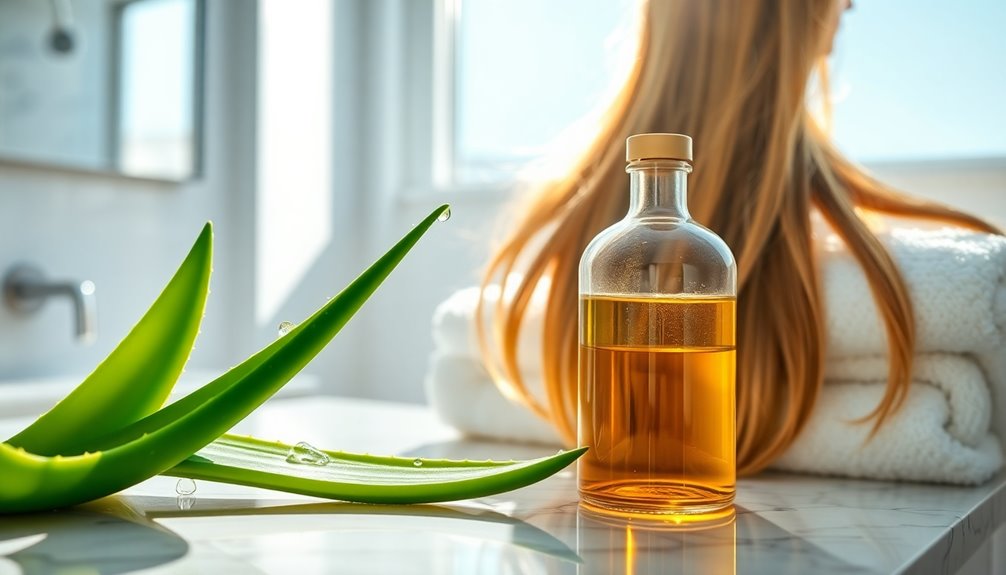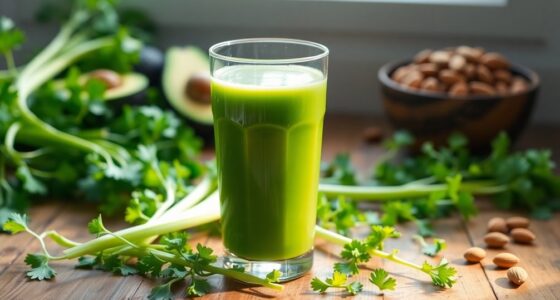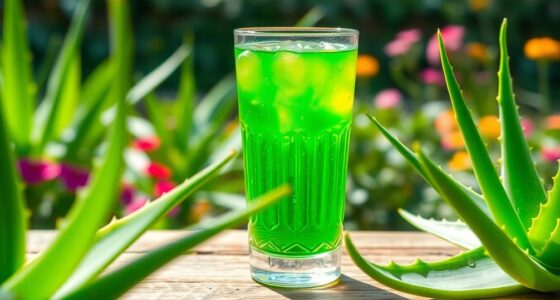Aloe Vera isn't just a plant; it's your hair's new best friend! With its high water content, it deeply hydrates and transforms dry, brittle strands into luscious locks. Packed with essential vitamins, it promotes healthy growth and reduces hair fall. Plus, its anti-inflammatory properties soothe your scalp and tackle dandruff. You can easily incorporate Aloe Vera into your routine, and there are fantastic DIY masks to try. Stick around to discover more amazing tips and recipes!
Key Takeaways
- Aloe Vera deeply hydrates hair, transforming dryness into softness and shine.
- Its rich vitamins promote healthy hair growth and reduce hair fall effectively.
- Anti-inflammatory properties soothe scalp issues like dandruff and itchiness.
- Aloe Vera acts as a gentle cleanser, removing excess oil without damaging natural moisture.
- Regular use leads to stronger, shinier hair and improved overall hair health.
Understanding the Power of Aloe Vera for Hair
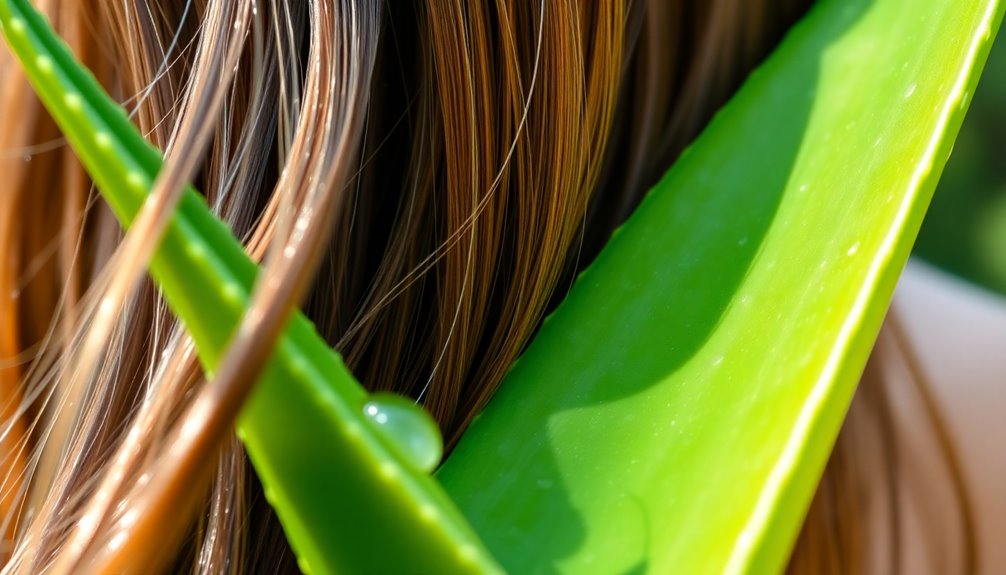
When you explore the benefits of Aloe Vera for your hair, you'll discover that this remarkable plant offers more than just hydration. Its high water content deeply moisturizes dry and brittle hair, transforming it into luscious locks.
Packed with essential vitamins and minerals like A, C, E, and B12, Aloe Vera nourishes hair follicles, promoting healthy hair growth and reducing hair fall. The anti-inflammatory properties soothe scalp conditions, alleviating issues like dandruff and itchy scalp.
Plus, its cooling properties refresh your scalp while acting as a gentle cleanser that removes excess sebum without stripping natural oils. By incorporating Aloe Vera into your routine, you can strengthen your hair, enhance shine, and promote healthy overall hair health.
Key Benefits of Aloe Vera for Hair Health
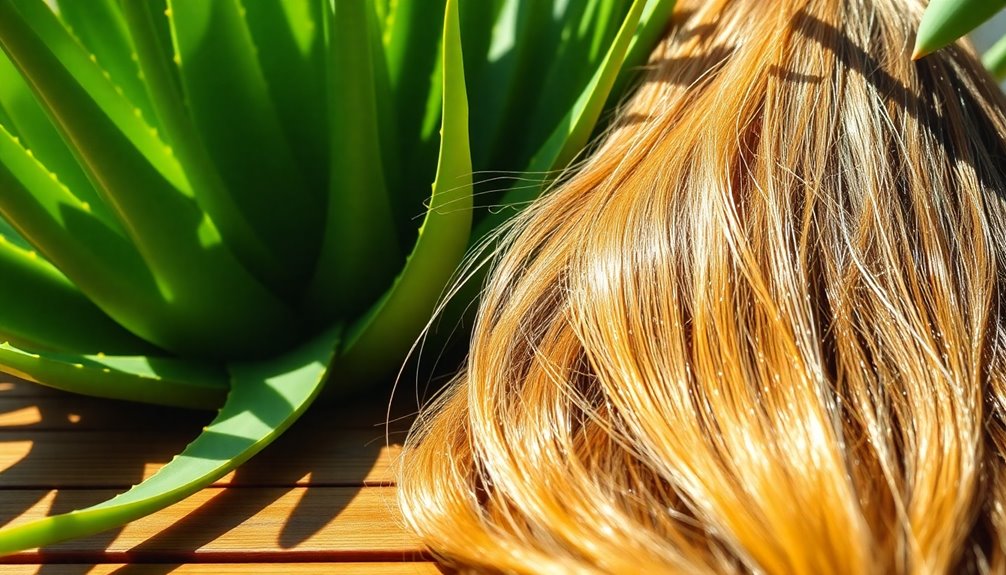
Aloe Vera delivers a multitude of benefits that can greatly enhance your hair health. Rich in vitamins A, C, E, and B12, Aloe nourishes hair follicles, promoting strong, healthy hair growth.
Its high water content provides deep hydration, leaving your hair soft, shiny, and manageable while preventing dryness and brittleness.
Aloe Vera acts as a natural remedy, helping to cleanse your scalp by removing excess sebum and chemical residues, resulting in a cleaner, healthier environment for your hair.
Regular application can greatly reduce hair breakage and split ends due to its strengthening properties.
Plus, the anti-inflammatory effects soothe your scalp, alleviating issues like dandruff and irritation, ultimately promoting overall scalp health.
Embrace these benefits for luscious locks!
How to Incorporate Aloe Vera Into Your Hair Care Routine
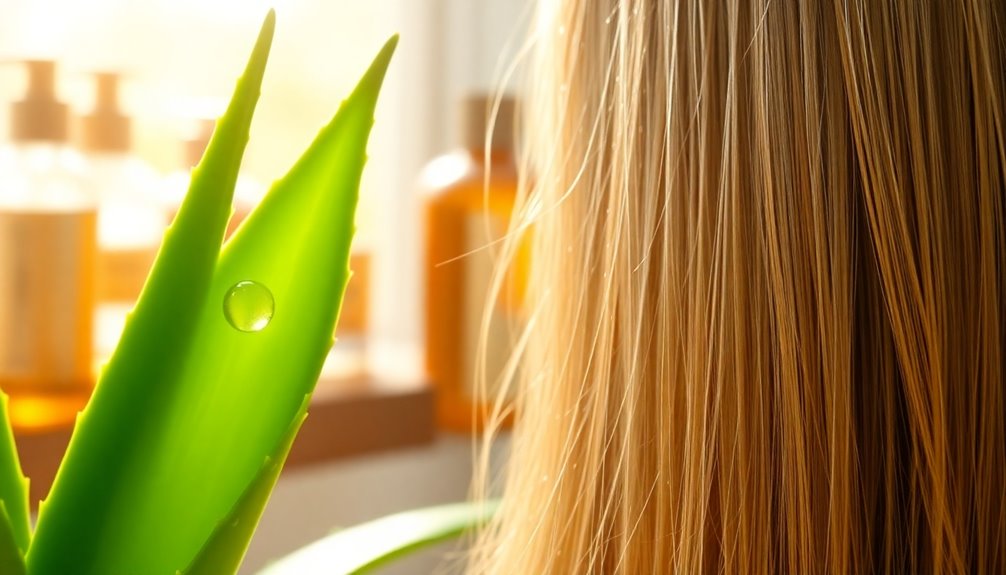
Incorporating Aloe Vera into your hair care routine is simple and rewarding, as it offers a natural way to enhance your hair’s health. To harness aloe vera benefits for hair care, you can apply the gel directly to your scalp to promote hydration and reduce dandruff. Additionally, using aloe vera as a natural conditioner can help improve the overall texture of your hair, leaving it soft and manageable. Regularly incorporating this versatile plant can lead to healthier hair growth and a more vibrant appearance.
Start by using Aloe Vera gel directly on your scalp and hair as a pre-shampoo treatment or leave-in conditioner for deep hydration. For convenience, consider Aloe Vera-infused hair products that provide moisture without harsh chemicals.
You can also create DIY Aloe Vera hair masks by mixing the gel with coconut oil or honey, boosting shine and conditioning benefits. Rinsing your hair with a mixture of Aloe Vera gel and apple cider vinegar promotes scalp health and removes product buildup.
To maintain luscious locks, aim for bi-weekly or weekly applications to promote healthy, smooth locks.
DIY Aloe Vera Hair Mask Recipes for Gorgeous Strands
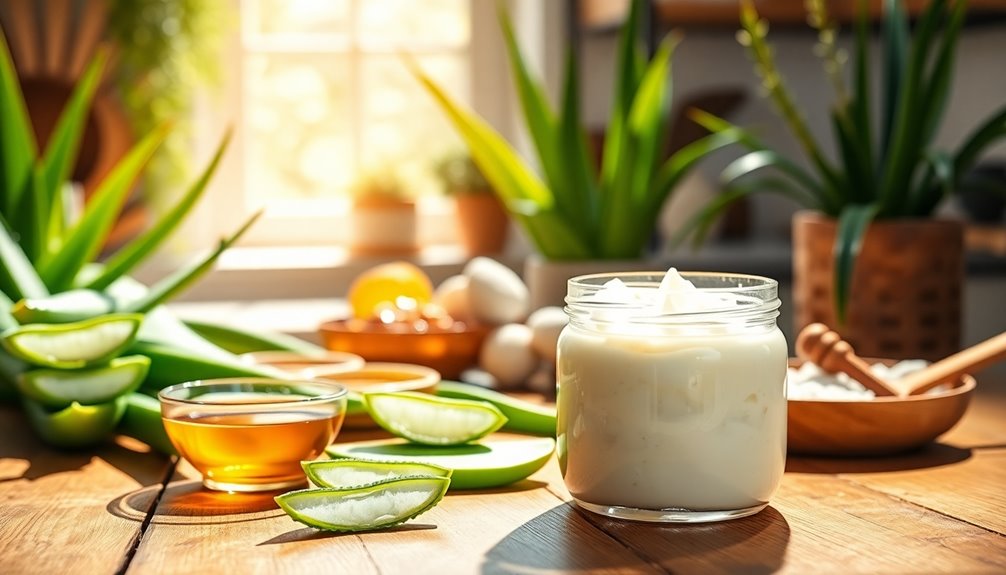
Releasing the full potential of your hair care routine can be as easy as whipping up a few DIY Aloe Vera hair masks.
For deep conditioning, mix 2 tablespoons of aloe vera gel with 1 tablespoon of coconut oil for hydration and nourishment.
If you're looking to promote scalp health, combine 4 tablespoons of aloe vera gel with 2 teaspoons of apple cider vinegar.
For a revitalizing boost, try the Aloe Vera and Green Tea mask by blending ½ cup of freshly brewed green tea with ½ cup of aloe vera gel, packed with antioxidants to reduce breakage.
Remember to conduct a patch test before applying any DIY hair masks to verify they're compatible with your skin type.
Enjoy your gorgeous strands!
Tips and Precautions for Using Aloe Vera on Hair
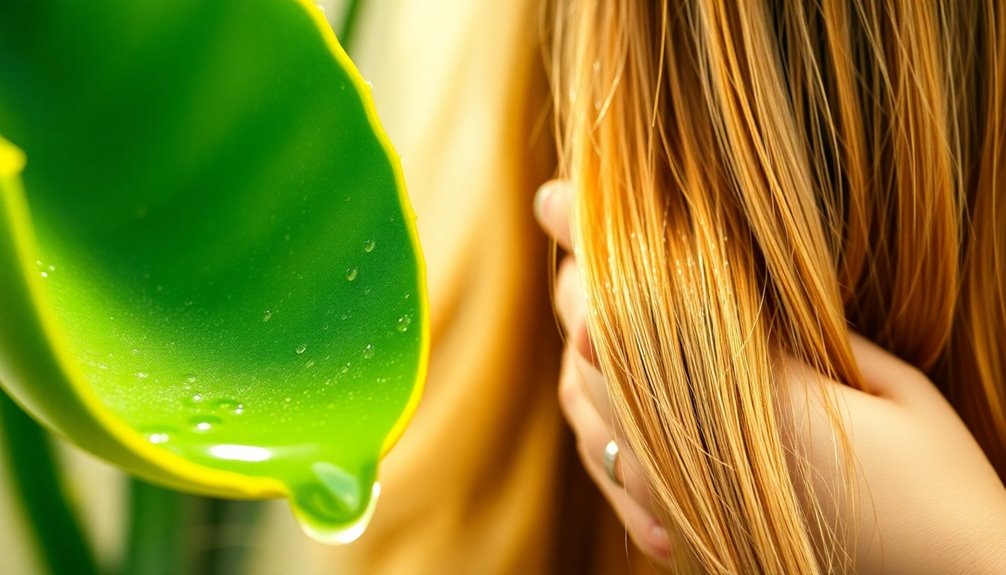
When you're ready to harness the benefits of aloe vera for your hair, it's important to follow some key tips and precautions.
Start with a patch test to verify you don't have any adverse reactions, especially if you have sensitive skin. Incorporate aloe vera gel into your hair care routine regularly, either as a pre-shampoo treatment or a leave-in conditioner, for healthy hair.
Pay attention to your scalp type, and monitor for any adverse reactions after application. If you're using hydrocortisone cream, avoid mixing it with aloe vera, as it may increase absorption and cause issues.
Finally, maintain a balanced diet rich in nutrients to enhance aloe vera's effectiveness and support overall hair health. Additionally, consider that anti-inflammatory properties of aloe vera can help soothe an irritated scalp, promoting healthier hair growth.
Frequently Asked Questions
Can Aloe Vera Really Regrow Hair?
Aloe vera can't guarantee hair regrowth, but it sure can boost your hair health. Its rich vitamins and amino acids nourish your follicles, potentially reducing hair fall.
When you massage aloe vera gel into your scalp, it stimulates blood circulation, which may supply more nutrients to your hair.
Regular use might even enhance your hair's density and energy, especially when paired with other natural oils.
What Does Aloe Vera Do for Locs?
Aloe Vera does wonders for your locs! It hydrates deeply, preventing dryness and brittleness.
The vitamins and minerals nourish your scalp, promoting healthy growth and reducing breakage. Its natural cleansing properties help you remove excess sebum and product buildup without harsh chemicals.
Plus, Aloe Vera soothes any scalp irritation and alleviates dandruff, creating a healthier environment for your locs.
Regular use can enhance their shine and softness, making them look even more beautiful!
What Happens if We Apply Aloe Vera on Hair Daily?
If you apply aloe vera on your hair daily, you'll notice significant improvements. It hydrates your hair, preventing dryness and brittleness while strengthening your follicles, which reduces hair fall.
Your scalp will feel soothed, and any itchiness or dandruff should lessen, thanks to its anti-inflammatory benefits.
Over time, you'll enjoy shinier, softer hair that's easier to manage, as aloe vera helps cleanse away product buildup and excess oil.
What Happens if You Leave Aloe Vera in Your Hair Overnight?
Leaving Aloe Vera in your hair overnight can be like wrapping your strands in a soothing blanket.
You'll wake up to deeply hydrated, softer hair, thanks to its high water content. The vitamins nourish your follicles, promoting healthier growth.
Plus, its natural cleansing properties help eliminate excess oil and buildup, giving you a fresher scalp.
Just remember to patch test first, as some may experience sensitivities.
Enjoy your revitalized locks!
Conclusion
Incorporating aloe vera into your hair care routine can transform your locks from dull to dazzling. With its nourishing properties, you're just a few steps away from achieving the hair of your dreams. So why wait? Embrace the magic of this natural wonder, and let your hair flow like a river of silk. Remember, your luscious locks are waiting; all you have to do is take that first step toward vibrant, healthy hair!
Cindy thoroughly researches juicing trends, techniques, and recipes to provide readers with practical advice and inspiration. Her writing style is accessible, engaging, and designed to make complex concepts easy to understand. Cindy’s dedication to promoting the advantages of juicing shines through her work, empowering readers to make positive changes in their lives through the simple act of juicing.

